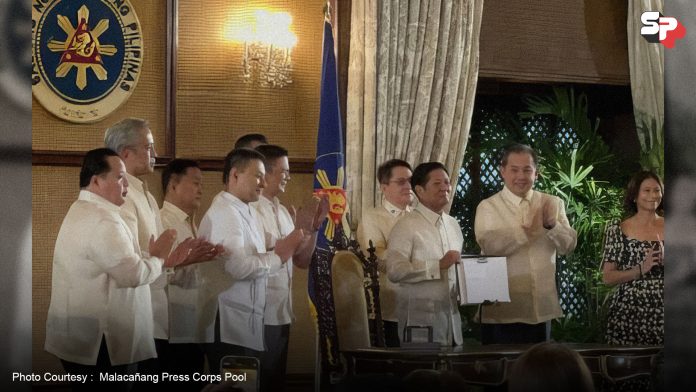MANILA – President Ferdinand R. Marcos Jr. on Friday signed the Republic Act (RA) 12028 or the Academic Recovery and Accessible Learning (ARAL) Law to accelerate learning recovery and improve the quality of education in the country.
During the ceremonial signing at Malacañan Palace in Manila, Marcos stressed the importance of RA 12028 in addressing the learning gaps, as he cited the 2018 Program for International Student Assessment which showed that the staggering 75 percent of Filipino learners “fell below the minimum proficiency levels in reading, mathematics and science.”
“This disheartening trend remained alarmingly the same, highlighting the urgency of the learning crisis that we confront today. It is imperative therefore that we acknowledge this massive challenge, determine the necessary steps, and prioritize the implementation of learning interventions,” Marcos said.
“With the signing of the ARAL Law, we embark on a definite journey to champion the right of every Filipino child to quality education, ensuring as well that it is accessible to all,” he added.
Marcos said the ARAL Law seeks to confront the broader challenges of mastering essential competencies and recovering from the learning loss through structured tutorial sessions.
The ARAL Law, a priority measure Identified by the Legislative-Executive Development Advisory Council (LEDAC), aims to create a national learning intervention program designed to help struggling learners catch up with the required standards for their grade levels.
Under the law, the Department of Education (DepEd) will spearhead the ARAL Program, a free national learning intervention program that will tap teachers and para-teachers, and pre-service teachers or those students enrolled in a teacher degree program offered by Teacher Education Institutions to help struggling learners attain the competencies set by the agency.
The program will focus on improving students’ competencies in essential learning areas, including reading and mathematics for Grades 1 to 10, and science for Grades 3 to 10.
The ARAL Program will focus on building foundational skills of the Kindergarten learners to strengthen their literacy and numeracy competencies.
To ensure the effectiveness and accessibility of learning, tutorial sessions will be conducted in three flexible delivery modes.
Learners have the option to choose either face-to-face tutorials, online tutorials, or blended learning, depending on their needs and circumstances.
An annual evaluation is needed to collect comparable data for the purpose of determining the impact of the program, while the impact evaluation will be submitted to Congress not later than six months after the end of every school year of implementation.
DepEd Secretary Sonny Angara thanked Marcos for the passage of the law, stressing that it is a critical intervention at a time when education needs the most support.
“This law demonstrates our collective resolve to uplift the state of education in the Philippines. With ARAL, we can help students regain their momentum and achieve the learning milestones they deserve,” he said.
Senate President Francis “Chiz” Escudero and Senator Sherwin Gatchalian cited the ARAL law as a critical intervention, particularly in the wake of pandemic-related learning losses.
“Malaki ang magiging tulong nitong ARAL Program para matugunan ang matagal na nating problema tungkol sa mga mag-aaral na hindi makapagbasa nang maayos at hirap sa matematika at agham (This ARAL Program will be of great help to address our long-standing problem of students who cannot read properly and have difficulty in math and science),” Escudero said in a statement.
“Proficiency in these essential learning competencies will serve as the foundation for individuals to become productive members of society,” he added.
In a separate statement, Gatchalian, who authored and sponsored the bill in the Senate, said the ARAL Program seeks to improve students’ proficiency in these subjects and prepare them for higher education or the workforce.
“The ARAL law will boost efforts to address learning loss and the education crisis hounding the country,” he said. (with a report from Wilnard Bacelonia/PNA)

